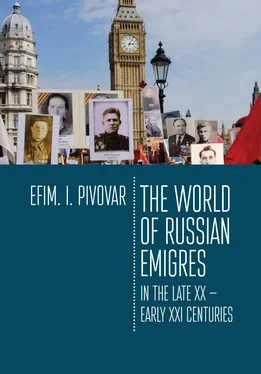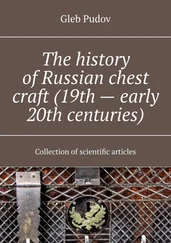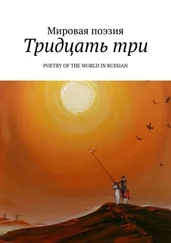As the role of international supranational organizations will increase in the context of globalization, so will that of institutional structures of the Russian world as an integral part of the global intellectual system. This offers a wide range of opportunities for intellectual and technological modernization of the Russian world, which in the future by all appearances will significantly differ from what it is now, in terms of organization, scientific and information activities, however it will preserve its cultural and mental self-identification with the historical Russian civilization. Without a doubt, new forms of realization and new areas of focus for the Russian world will emerge, and its qualitative characteristics will improve.
Thus, the Russian world in the 21 stcentury is capable of creating new forms and perhaps specific institutional structures of beneficial and adequate transnational interaction that can “fit” Russian historical culture into the global intellectual space and the world system of new geopolitical alliances and associations. In the 21 stcentury, the Russian world institutions will contribute to the greater promotion of Russia’s interests in the new global political and economic system, shaping those structural, informational, and cultural “islands” for the Russian business, culture, science, and society as a whole to rely on.
The present publication presents the author’s reflections on the modern situation in the Russian world and its interaction with Russia and the world civilization in the face of complex geopolitical transformations of the late 20 th-early 21 stcenturies. Among other things, it seems important to study the role of the Russian community abroad in today’s world, to follow up its role in domestic and foreign policy of the Russian Federation over time. In my opinion, evolution of the social and cultural image of Russian-speaking diasporas in the CIS, the Baltic states, and European Union and development of a dialogue with their historical homeland, states and societies in the countries of residence, etc. is another topic of high scientific interest.
At the same time, my intention is to give a personal touch to this work, to reveal the role of the history and culture of the Russian community abroad in my research and academic activities.
The book is intended for scholars of history and other humanities, government officials responsible for interaction with compatriots residing abroad, and the scientific and cultural community of the Russian world itself, as well as all readers interested in the subject of Russian community abroad in the late 20 th– early 21 stcenturies.
Chapter 1
The world of Russian compatriots and national historical consciousness
January 2014 witnessed an important development in the life of the Russian historical community and personally for me as the Head of the Russian State University for the Humanities. Together with other participants of the working group on the preparation of a new cultural-historical standard on history for secondary schools, I took part in a meeting in the Kremlin with the Russian President Vladimir Putin. The Chairman of the Russian Historical Society Sergey Naryshkin, members of the Russian government, heads of historical institutes at the Russian Academy of Sciences, leading university professors of history, history teachers, media, etc. contributed to this discussion. All those present were unanimous in assessing the task facing the historical community as difficult and responsible. In practice, the Concept of a new history standard took considerable effort and generated a lot of controversy that in the end did the Concept a lot of good. ‘Competing history schools are the driver behind new historical knowledge,’ Sergey Naryshkin said. [10] Transcript of the meeting of Vladimir Putin, President of Russia with the authors of the new history textbook concept. Moscow, the Kremlin. (2014, January 16). Retrieved from http: www.kremlin.ru/events/president/news/200071
The Kremlin meeting definitely stimulated further work, both because the President thanked the participants for their work and civic position, and above all else because the meeting confirmed at the highest state level some very important principles for history academic courses, i. e. objectivity and impartiality, education aimed at bringing up educated citizens who can think for themselves. Vladimir Putin, in particular, stressed the following:
Unified approaches to history academic courses do not mean public, official, and ideological consensus at all. On the contrary, we mean the common logic of teaching history, understanding the inseparability and interconnection of all stages of the development of our state and our statehood, the fact that the most dramatic and controversial events constitute an integral part of our past. Despite all the differences in assessments and opinions, we should treat them with respect, because this is the life of our people, this is the life of our ancestors, and our national history is the basis for our national identity, cultural, and historical code. [11] Ibid.
Back then we also discussed some questions related to certain key dates in the Russian history and their approaching anniversaries. They also needed some balanced approaches to complex historical events and phenomena like the 100th anniversary of World War I, the 70th anniversary of the victory in the Great Patriotic War, the 100th anniversary of the February and October Revolutions. Projects of the Russian History Society, like scientific conferences, exhibitions, new publications concerning the anniversaries of WWI and the Great Victory, the 100th anniversary of the Russian Revolution received wide media coverage both in Russia and in the Russian community abroad. As far as I can judge, the success of all these projects depended on the fact that they promoted a comprehensive range of ideas and images rather than some commonplace official narrative. This created conditions for a positive intellectual dialogue and laid the foundation of the true patriotism, i. e. understanding of all the complexity and unique features of our national history. In many ways, that is why the response of foreign compatriots, representatives of different countries and generations, was so sincere and massive with exhibitions, meetings, and veteran commemoration events taking place all over the Russian community abroad, from New York to Beijing.
Greater focus on history, history science, and education in the Russian society is quite a natural reaction to Russia affirming its status as a world power. Real patriotism in the best sense of the word is inextricably linked to the knowledge and understanding of the history of one’s Fatherland. I firmly believe that patriotic education is education through knowledge about one’s country, its history, and culture of its peoples, and at the same time, about other peoples and civilizations. Such education is designed to develop a broadly educated and cultured individual, including a habit of tolerant perception of ideas and opinions and different historical experience. It is possible to understand events of the pre-revolutionary and Soviet history in different ways, but it is impossible to deny the hard work and the great feat of the peoples of our country, i. e. the feat of overcoming the trials faced by Russian in the 20 thcentury. Those who did this were not some abstract entities but real people, someone’s parents and grandparents. The action “Immortal Regiment,” which triumphantly took place throughout the country and in the Russian community abroad in 2015–2016 and has already become our national tradition, has clearly showed it by addressing the historical memory of thousands of real families. Many students and teachers from Russian universities took part in the “Immortal Regiment” campaign, including the Russian State University for the Humanities, Lomonosov Moscow State University, etc. It is also possible that for some of the younger participants, learning about family history has become the first step towards the profession of a historian.
Читать дальше












